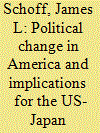| Srl | Item |
| 1 |
ID:
181100


|
|
|
|
|
| Summary/Abstract |
Governments may resort to a wide range of economic policies to generate revenue and compensate certain sectors in civil wars. Such measures block market access and hurt the interests of third-party countries operating in this market, giving the latter an incentive to shape the course of events in the conflict. To empirically demonstrate this argument, I look at changes in tariff rates adopted by civil war governments to restrict international trade during conflict. I find strong empirical evidence that external actors consider economic interventions on behalf of the government to meet the demand for revenue and for a return to more liberal policies.
|
|
|
|
|
|
|
|
|
|
|
|
|
|
|
|
| 2 |
ID:
118156


|
|
|
|
|
| Publication |
2012.
|
| Summary/Abstract |
What are the sources of popular opposition to economic globalization? A common answer in the literature is the adverse impact of trade liberalization on some people's labor market standing and earning prospects. Recent studies also note a correlation between nationalist and ethnocentric sentiments and support for trade protectionism, yet do not test whether these non-economic sentiments are actually a cause of the opposition to freer trade. I argue that many individuals fear not only the oft-cited material consequences of trade openness, but also what they perceive to be its social and cultural consequences. I use cross-national survey data and a survey experiment to test this causal claim. The argument also helps explain why less-educated individuals are consistently more apprehensive about international economic integration than more educated individuals, even in the countries in which economic theory predicts otherwise. The findings have implications for the debate over the policy tools for compensating globalization's losers and sustaining popular support for further economic integration.
|
|
|
|
|
|
|
|
|
|
|
|
|
|
|
|
| 3 |
ID:
163370


|
|
|
|
|
| Summary/Abstract |
This article examines the domestic political dynamics behind US president Donald Trump’s “America First” approach to trade and foreign policy, to understand better how long this strain of American economic nationalism might last and what it means for Japan’s national security strategy. The political base for Trump’s trade protectionism and apparent indifference to allies has roots stretching back into American history, but this movement has strengthened in recent years due to a combination of growing economic inequality in the United States, demographic changes, and the impact of fast-paced technology development and economic globalization. These political trends are likely to persist beyond Trump’s presidency, although some potential negative effects on Japan and the US-Japan alliance in the medium-to-longer term can be mitigated by Japan’s proactive foreign policy and other steps. The alliance still offers a great deal of value to both countries—now and into the future—but Japan should consider a slightly larger global leadership role in concert with others, even as the allies work to enhance their continued cooperation on shared interests.
|
|
|
|
|
|
|
|
|
|
|
|
|
|
|
|
| 4 |
ID:
118946


|
|
|
|
|
| Publication |
2013.
|
| Summary/Abstract |
More than three decades have passed since Deng Xiaoping opened China to the outside world with a series of sweeping economic reforms. Yet, before China entered the World Trade Organization (WTO) in 2001, even at the height of free trade in the 1990s while lowering trade barriers overall, the Chinese government continued to protect some industries. This article explores the cross-industrial variation in trade protectionism in the 1990s, when the Chinese government was negotiating for accession to the WTO. It demonstrates that the major incentive of the Chinese government for trade protectionism was political, involving such factors as the state sector's inefficiency, the ease with which workers could organize to rebel, and bureaucratic organizations' pressure on the government on behalf of certain industries. The Chinese government chose to protect certain industries to prevent free trade from exacerbating social instability in the 1990s.
|
|
|
|
|
|
|
|
|
|
|
|
|
|
|
|
| 5 |
ID:
073351


|
|
|
|
|
| Publication |
2006.
|
| Summary/Abstract |
The article examines the characteristics of the United States' (US) discriminatory protection measures, especially the antidumping (AD) duties, against China. China has been the most significant target of US trade protectionism in terms of the absolute number as well as the intensity of measures. There exists a positive relationship between the US bilateral trade deficit and the increase in the number of its discriminatory trade protection measures against China. US AD decisions against China have been led by the chemical industry, followed by the iron and steel industry. It is expected that the number of US discriminatory trade protection measures against the Chinese textile products will increase in the coming years, since the ten-year phase-out of the Multi-Fibre Arrangement (MFA) was completed at the end of 2004. Since discriminatory trade restrictions are costly in terms of the welfare of the concerned countries, it would be necessary for them to apply stricter regulations regarding the discriminatory protection measures.
|
|
|
|
|
|
|
|
|
|
|
|
|
|
|
|